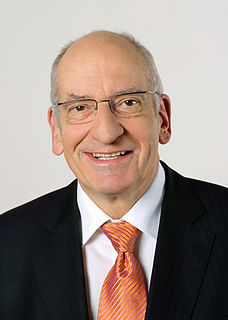A Quote by Samuel Taylor Coleridge
Too soon did the doctors of the church forget that the heart--the moral nature--was the beginning and the end, and that truth, knowledge, and insight were comprehended in its expansion.
Related Quotes
If you look at figures, we have a good supply of doctors in Switzerland. They always say that in the future we shall have a lack of home doctors, family doctors. I'm not sure of that, but we have a problem of formation. Every year there [are] about 1,000 students beginning medical studies, and at the end of the formation there are only 600 young people getting the diploma. It means that about 40 percent of the students fail during the studies, although there is a selection at the beginning. Forty percent is too much as failure, so probably there is a problem in the formation, education.
What we learn for the sake of knowing, we hold; what we learn for the sake of accomplishing some ulterior end, we forget as soon as that end has been gained. This, too, is automatic action in the constitution of the mind itself, and it is fortunate and merciful that it is so, for otherwise our minds would be soon only rubbish-rooms.
The moment of truth, the sudden emergence of a new insight, is an act of intuition. Such intuitions give the appearance of miraculous flushes, or short-circuits of reasoning. In fact they may be likened to an immersed chain, of which only the beginning and the end are visible above the surface of consciousness. The diver vanishes at one end of the chain and comes up at the other end, guided by invisible links.
All those formal systems, in mathematics and physics and the philosophy of science, which claim to give foundations for certain truth are surely mistaken. I am tempted to say that we do not look for truth, but for knowledge. But I dislike this form of words, for two reasons. First of all, we do look for truth, however we define it, it is what we find that is knowledge. And second, what we fail to find is not truth, but certainty; the nature of truth is exactly the knowledge that we do find.
And, as soon as possible, be on the lookout for someone whose whole manner of speaking and being makes, as it were, a "sound" that draws your mind and heart. And then, little by little, try to see if that person can be of real help on the way to genuine self-knowledge and insight about what God is and is not. In this realm, more than any other even, the paradoxical marriage of both openness and scepticism is essential.
Unfortunately, once an economy is geared to expansion, the means rapidly turn into an end and "the going becomes the goal." Even more unfortunately, the industries that are favored by such expansion must, to maintain their output, be devoted to goods that are readily consumable either by their nature, or because they are so shoddily fabricated that they must soon be replaced. By fashion and built-in obsolescence the economies of machine production, instead of producing leisure and durable wealth, are duly cancelled out by the mandatory consumption on an even larger scale.
The difference between the "natural" individuation process, which runs its course unconsciously, and the one that is consciously realized is tremendous. In the first case, consciousness nowhere intervenes; the end remains as dark as the beginning. In the second case, so much darkness comes to light that the personality is permeated with light and consciousness necessarily gains in scope and insight. The encounter between conscious and unconscious has to ensure that the light that shines in the darkness is not only comprehended by the darkness, but comprehends it.







































